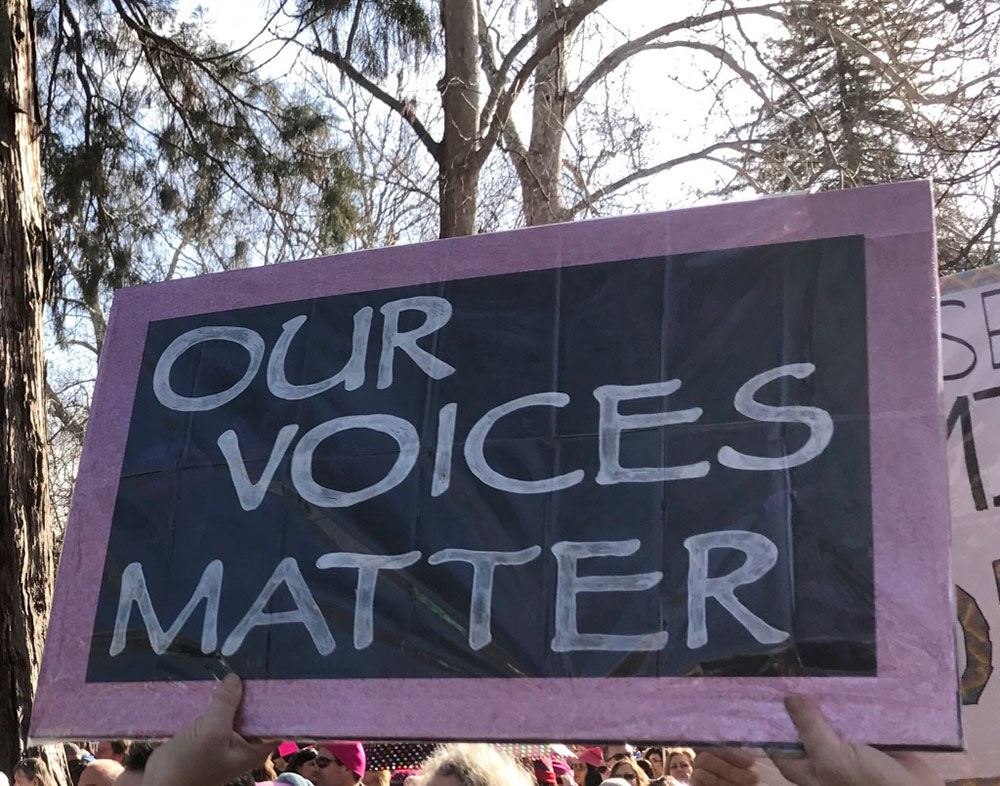May 9, 2025 | Civil Rights Law, Constitutional Rights, First Amendment
Protecting free speech and defending against First Amendment retaliation

The purpose of Colorado’s anti-SLAPP law
In a democratic society, the ability to voice opinions about government actions and the conduct of public officials is fundamental. However, sometimes those in power try to silence criticism through costly and intimidating lawsuits. Colorado’s anti-SLAPP law can shield those speaking out on matters of public concern.
Colorado joined the ranks of states with strong anti-SLAPP protections in 2019 when Governor Jared Polis signed House Bill 19-1324 into law. “SLAPP” stands for Strategic Lawsuit Against Public Participation. These lawsuits are often legal bullying tactics used to silence critics by threatening them with expensive litigation.
The Colorado General Assembly recognized this problem and enacted the anti-SLAPP statute, noting “that it is in the public interest to encourage continued participation in matters of public significance and that this participation should not be chilled through abuse of the judicial process.” They stated that the purpose of the law was “to encourage and safeguard the constitutional rights of persons to petition, speak freely, and otherwise participate in government to the maximum extent permitted by law and, at the same time, to protect the rights of persons to file meritorious lawsuits for demonstrable injury.” (C.R.S. § 13-20-1101)
This balancing act helps maintain both free expression and access to justice. The statute protects individuals’ rights to participate in government and speak on matters of public concern while ensuring that truly injured parties can still seek redress through the courts.
SLAPP suits have been used against journalists, environmental activists, consumer advocates, and everyday citizens, like Colorado parents who speak out on matters of public concern involving their schoolchildren. By providing anti-SLAPP protections, Colorado allows journalists to report without fear of financial consequences to their newsrooms and empowers citizens to participate in democratic discourse without fear or intimidation.
How do anti-SLAPP laws work?
Using the special motion to dismiss: A powerful tool for defendants
Colorado’s anti-SLAPP law provides a powerful tool for people who believe they face meritless lawsuits targeting their protected speech. It establishes an expedited process for courts to follow when a defendant files a motion to dismiss a lawsuit based on the fact that they were exercising their constitutional right of free speech or to petition the government.
Here is how this special motion to dismiss works:
-
Filing the motion: A defendant can file a special motion to dismiss within 63 days after being served with the lawsuit. Extensions may be granted with court permission.
-
Showing protected speech: The defendant must demonstrate that the lawsuit is based on their speech or conduct involving a matter of public concern. The law specifically protects statements made before legislative, executive, or judicial proceedings; statements made in connection with issues under consideration by governmental bodies; statements made in public forums about matters of public interest; and other forms of protected speech.
-
Automatic stay of discovery: When a defendant files this special motion, the court issues an automatic stay of discovery, pausing the expensive discovery process until the motion is resolved. This is a crucial protection that prevents plaintiffs from using the discovery process to harass defendants or rapidly drive up litigation costs.
-
Shifting the burden: Once the defendant demonstrates that the case involves protected speech, the burden shifts to the plaintiff to establish “a reasonable likelihood” of prevailing on the claim. This higher standard at an early stage of litigation provides significant protection for defendants.
-
Expedited hearing: The court should hold a hearing on the special motion to dismiss no later than 28 days after it is filed unless the court must schedule it for a later date. This ensures a speedy resolution rather than allowing a SLAPP suit to drag on indefinitely.
-
Attorney fees and costs: If the defendant prevails on the special motion to dismiss, they are entitled to recover attorney fees and costs from the plaintiff. This financial consequence serves as a deterrent against filing frivolous lawsuits intended only to silence protected speech. But if the court finds that a defendant’s special motion was frivolous or solely intended to cause unnecessary delay, it will award attorney fees and costs to the plaintiff instead.
-
Immediate appeal: The order granting or denying the special motion is immediately appealable to the Colorado Court of Appeals. This provides an additional layer of protection for both parties’ rights. (C.R.S. § 13-20-1101.)
The Colorado anti-SLAPP statute has been applied in various contexts, including a recent case before the Colorado Supreme Court examining the “public interest” parameters of the law regarding online reviews of a veterinary clinic. (Tender Care Veterinary Ctr. v. Lind-Barnett)
First Amendment retaliation claims after successful anti-SLAPP motions
An interesting legal scenario arises when a government employee sues a citizen for statements made about that employee’s official actions, and the citizen successfully defends using an anti-SLAPP motion. In such cases, the citizen might have grounds for a First Amendment retaliation claim against the government employee.
While there isn’t a Colorado precedent directly on point, the U.S. Court of Appeals for the Tenth Circuit (which includes Colorado) has provided guidance in cases involving government retaliation for protected speech. In Beedle v. Wilson, the court considered a case where a governmental entity (a public hospital) filed a defamation lawsuit against a private citizen who had criticized it.
The Tenth Circuit recognized that when a governmental entity brings a lawsuit against a citizen for criticizing government actions, First Amendment concerns are implicated. The court determined that such a lawsuit could potentially constitute retaliation that violates the First Amendment and provides grounds for a civil rights claim under law. (42 U.S.C. § 1983)
How First Amendment retaliation claims work using Colorado’s anti-SLAPP law:
-
Protected speech: The defendant’s statements about the government employee’s political or governmental actions would need to constitute protected speech under the First Amendment, which generally protects speech on matters of public concern. The Supreme Court has long held that speech on matters of public concern deserves heightened First Amendment protection, such as in N.Y. Times Co. v. Sullivan, where the court noted the “profound national commitment to the principle that debate on public issues should be uninhibited, robust, and wide-open.”
-
Adverse action: The government employee’s act of filing a lawsuit against the defendant can be considered an adverse action likely to deter a person from continuing to engage in protected speech. In Beedle, the Tenth Circuit recognized that being subjected to litigation could constitute such an adverse action.
-
Causal connection: The crucial element is demonstrating a causal connection between the defendant’s protected speech and the government employee’s retaliatory action (filing the lawsuit). A successful anti-SLAPP motion can provide evidence of this causal link, as it establishes that the lawsuit targeted protected speech.
-
Improper motive: To succeed on a First Amendment retaliation claim, the defendant must show that the government employee’s primary motive in filing the lawsuit was to retaliate against the defendant for their protected speech, rather than to genuinely seek legal redress for a legitimate harm.
In Colorado, this means that if a government employee sues a citizen for statements about the employee’s political or governmental actions, and the citizen successfully defends using Colorado’s anti-SLAPP law, the citizen may have grounds for a federal civil rights lawsuit.
Such a claim would allege that the government employee’s lawsuit constituted illegal retaliation for the exercise of First Amendment rights. If successful, the citizen could recover damages, attorney fees, and costs beyond what the anti-SLAPP statute itself provides. The Civil Rights Attorney’s Fees Awards Act authorizes courts to award reasonable attorney fees to prevailing parties in civil rights litigation.
It’s worth noting that these retaliation claims face certain legal hurdles. The citizen must prove that the government employee acted under “color of law” rather than in a purely private capacity. As the Supreme Court has held, the under-color-of-state-law element of the code excludes from its reach “merely private conduct, no matter how discriminatory or wrongful.” (Blum v. Yaretsky)
Additionally, various immunity doctrines may protect government officials in certain circumstances. Government officials performing discretionary functions are entitled to qualified immunity unless their conduct violates “clearly established statutory or constitutional rights of which a reasonable person would have known.” (Harlow v. Fitzgerald)
 Has your free speech been threatened?
Has your free speech been threatened?
When government employees misuse the legal system to silence criticism of their official actions, the combination of anti-SLAPP protections and potential First Amendment retaliation claims gives citizens powerful legal recourse. They ensure that individuals can speak truth to power without fear of retaliatory litigation designed to silence their voices.
However, while these anti-SLAPP laws shield citizens from legal intimidation tactics, you need an experienced civil rights attorney to help you fight these lawsuits. The Civil Rights Litigation Group understands the expedited process to dismiss meritless lawsuits targeting free speech and the First Amendment retaliation claims that may follow. We believe the law should protect rather than punish those who exercise their constitutional right to comment on matters of public concern. If your free speech rights have been violated, contact us today to see how Colorado’s anti-SLAPP law can protect you.
Call the Civil Rights Litigation Group at 720-515-6165.
Oct 21, 2024 | Constitutional Rights, Police Misconduct
 What are your rights when the police come to your home?
What are your rights when the police come to your home?
Whenever you encounter the police, knowing your rights is important, especially when they come to your home. Just because you are innocent of a crime doesn’t mean you can’t get in trouble. There are many places where you might encounter the police so know what they can and can’t do, and what you are allowed to do when interacting with them.
What can the police do at your home?
Police are generally allowed to go anywhere in public that other members of the public are allowed to go. This could involve stopping/driving on any roadways, making observations in public neighborhoods, or walking up to your front door to make an inquiry (often called a knock and talk). If the police knock on your door, the first thing to remember is to stay calm and treat them with respect – this goes a long way in keeping the interaction calm. Whatever reason they are there, you do not have to invite them in unless they have a warrant. Otherwise, it’s always best to just speak with them at your door and ask for their identification before doing so. If the police are simply there to ask if you witnessed a crime in the neighborhood or have seen someone like a missing child, you can choose to be helpful and let them know if you saw anything. Or you can simply tell them you have no helpful information to provide. If they do have a warrant, you have the right to request seeing it before letting them in. Be sure it is signed by a judicial officer and that it is specifically for your address. The warrant might also list specific areas they are allowed to search (or for specific items) and will have the name of the person, places, and things to be searched.
What should you do during a search of your home?
Again, remain calm and don’t escalate the situation if the police search your home. Remember that you have the right to remain silent as they will often ask you questions while searching. You do not have to answer any questions, and they can’t arrest you simply because you refuse to speak to them. You can also record what the police do during the search and take notes as long as you don’t interfere in what they are doing. Ask for each officer to identify themselves, their badge number, and give you a business card if they have one. Make note of anything they take and every room they search, as well as any damage they might cause to your home. Police are often allowed to ask you to step out of an area to be searched or, sometimes, even detain you for a period while a search is taking place. Don’t fight, just ask if you are required to as they ask, and then do so if required. You can always ask a lawyer later if the police command was justified or open to challenge. If they do end up arresting you at the end of the search, don’t resist, and remember to remain silent and ask for an attorney. If they read you your Miranda rights and you ask for an attorney, they can’t ask you any more questions without an attorney present. Even if you are innocent, it’s always best to have an attorney or a public defender present for any questioning. Remember that the police are very good at interrogating people and are allowed to lie about certain things.
What do you do if your rights are violated?
If you feel your rights have been violated during a search of your home, it’s even more important that you record all the details as they happen. Make sure you have all the information from the search, and you can file a complaint with internal affairs or a civilian complaint board (if your city has one). Beyond that, you can contact a law firm that specializes in civil rights cases regarding the police, and your rights while in your home or anywhere else. The Civil Rights Litigation Group has handled many cases against the police and can help you protect your rights. Call for a free consultation.
Call 720-515-6165 for a free consultation.
Mar 17, 2024 | Civil Rights Law, Constitutional Rights
The First Amendment of the Constitution states that “Congress shall make no law respecting an establishment of religion, or prohibiting the free exercise thereof; or abridging the freedom of speech, or of the press; or the right of the people to peacefully to assemble, and to petition the Government for a redress of grievances.” However, free speech isn’t an all-inclusive principle, meaning that there are some instances of speech and expression that the First Amendment doesn’t protect. What is protected speech?

Free speech and protected speech
One reason for continually examining free speech is that the Constitution is vague. The Supreme Court further defined free speech: “If there is a bedrock principle underlying the First Amendment, it is that the government may not prohibit the expression of an idea simply because society finds the idea itself offensive or disagreeable” (Texas v. Johnson). This language restricts the government’s ability to constrain speech, but, the limitations of speech and expression often depend on context, such as a corporate office or a school.
Free speech laws are extremely complex, and it’s critical to remember that free speech doesn’t protect things like defamation and libel, threats, false advertising, and more.
Differences between protected speech and unprotected speech
There are many exceptions to free speech that the Supreme Court has supported for some time. For example, the Court has decided that the First Amendment provides no protections for things like obscenity, child pornography, or speech that constitutes true threats or “fighting words,” which may produce a clear and present danger. The Court provides less than full protections for many other types of speech, including:
- Commercial speech
- Defamation, libel, and slander
- Speech that might be harmful to children
- Speech broadcasts on television and radio
- Public employees’ speech
At the same time, the Supreme Court, as well as many government and nonprofit agencies, have contributed to the definition of protected speech as well. As a broad rule, virtually all other types of speech are protected, but the government may be able to regulate speech in certain circumstances. The government may attempt to regulate an act of free speech (including verbal communication as well as visual, art, music, theater, dance, literature, and more) through prior restraint. Additionally, acts that normally have the fullest First Amendment protections may still be restricted due to “regulations of the time, place, and manner of expression which are content-neutral, are narrowly tailored to serve a significant government interest, and leave open ample alternative channels of communication.”
What to do if your free speech rights were violated
To better understand what constitutes protected speech and unprotected speech (and therefore, your rights in Colorado regarding free speech), here are a few examples:
-
Subversive advocacy — Individuals can express lawlessness, but there is a limit to this protection. For subversive advocacy (expression promoting lawlessness) to fall outside of First Amendment protections, it needs to be directed at producing imminent lawless action and the speech needs to be likely to produce lawless action.
-
Fighting words — Similar to the above example, speech cannot incite clear and present danger or violence. However, fighting words often need to be insults personally directed at a person and not political statements that the person would find offensive. Provocative political speech is often fully protected, but not clear and directed insults designed to start a fight or a threat.
-
True threats — True threats are defined as “statements where the speaker means to communicate a serious expression of an intent to commit an act of unlawful violence to a particular individual or group of individuals.” As such, the speaker may not need to carry out the threat, but only to intently produce fear of bodily harm or death in the victim.
-
Obscenity — Material, speech, and/or expression must meet the following three standards to be considered obscene and not protected by First Amendment laws. These three standards include:
- Whether “the average person, applying contemporary community standards”, would find that the work, taken as a whole, appeals to the prurient interest
- Whether the work depicts or describes, in a patently offensive way, sexual conduct or excretory functions specifically defined by applicable state law
- Whether the work, taken as a whole, lacks serious literary, artistic, political, or scientific value.
-
Child pornography. Plainly put, child pornography is an unprotected category of expression.
-
Commercial expression that concerns illegal activity, or commercial expression that is false or misleading — Commercial speech is only protected if it contains legal activity and it’s content is true and not misleading.
Contact the Civil Rights Litigation Group in Denver
The Civil Rights Litigation Group deals with issues regarding free speech. First Amendment and protected speech legal cases can be extremely complex, but at the same time, it is clear when someone is making true threats, producing obscene material, or producing false advertising and misleading information. Fortunately, if your right to free speech is being regulated or restricted in any way — or you’re facing adverse repercussions for your speech, and your speech doesn’t fall under the umbrella of “unprotected speech”— then call the Civil Rights Litigation Group in Denver, CO. We offer free, no-obligation consultations.
Call our law offices today at 720-515-6165.
Jun 12, 2022 | Constitutional Rights, Police Misconduct

In a nutshell, Malicious prosecution happens when someone — either a police officer or a private citizen — maliciously causes judicial process to commence (often through criminal charges or a civil lawsuit) against you without evidence or probable cause, and with malice. If this has happened to you and the case was decided in your favor, you may be able to file a malicious prosecution lawsuit against that party if you suffered any damages. The laws are slightly different based on whether a federal claim or a state claim is pursued, and whether a government official or private citizen caused the harm. Generally, the claim was put in place to prevent abuse of the legal system. For both federal and state claims in Colorado, you have two years to file a lawsuit for malicious prosecution, which time period begins when the case that was wrongfully initiated is terminated in your favor (i.e. when the case against you is dismissed).
What is required to sue a police officer for malicious prosecution?
The main requirement when filing a malicious prosecution lawsuit is being able to prove that the case against you was filed without an adequate evidentiary basis (usually, without probable cause) and that it was brought maliciously. Maliciously means that the officer knew or had clear and obvious information that showed you did not commit the crime, but charged you anyway, with reckless disregard for the truth. Malice can also mean the officer charged you because of their own ulterior reasons — a reason other than to bring a guilty offender to justice. For example, a police officer might charge you with something you didn’t do because you threatened to turn them in for abusing their power or violating a law. Or they might file false charges for discriminatory reasons based on race or gender. Or they could charge you with resisting arrest or obstruction to attempt to justify/cover-up their own illegal use of excessive force. Whatever the reason, these kinds of charges may violate your Fourth Amendment rights against illegal search and seizure, and unlawful imprisonment.
In order to file a malicious prosecution claim against law enforcement officers under the Fourth amendment, you must be able to prove five things (Wilkins v. DeReyes, 528 F.3d 790, 799 (10th Cir. 2008):
- The officer caused or continued to cause you to be confined (imprisoned) or prosecuted.
- No probable cause supported the original arrest or continuing prosecution.
- The criminal case ended and was decided in your favor.
- The officer acted with malice.
- You sustained injuries as a result.
What damages can you claim from malicious prosecution?
Even if the charges filed are baseless, you still must defend yourself against them and that costs time and money. Court cases can drag on for years and attorney fees can pile up. And even if you win the case or it get dropped, you still (in most cases) must pay your lawyer.
Additionally, you might face public shaming and scrutiny because of the charges. Say a police officer falsely charges you with having illegal drugs in your car. Even if the case is decided in your favor, there may have been press on the case that has damaged your reputation and lost you clients. If you spent time in jail because of the charges, you probably suffered lost wages and maybe lost your job altogether. Again, these cases can often drag on for years and you could suffer emotional damage as well as professional and financial damages.
Either way, the malicious charges have harmed you and you have a right to seek compensation for that.
Suing prosecutors for malicious prosecution

It is much more difficult to sue prosecutors for malicious prosecution because they are protected by prosecutorial immunity laws that shield them from lawsuits. These laws are designed to enable them to do their job without constantly worrying that they are going to be sued by every defendant. But there are limits to those laws and if you can prove that a prosecutor acted outside the scope of their prosecutorial decision-making and didn’t have probable cause for charges to be advanced against you, you might have a case. However, such claims are most often filed against the involved officers — who gather and present evidence at the time of arrest — and not the prosecutors.
In 2020, Colorado passed a law that allows for a state-based causes of action for civil rights violations without qualified immunity protection for police officers and now some lawyers and lawmakers are pushing for a limit to prosecutorial immunity protections as well.
An example of a malicious prosecution case
In February 2017, Juan Valenzuela was accused by Denver Police of using a fake ID while attempting to catch a flight at Denver International Airport. The ID had been through the wash so it was slightly damaged, but it was not fake. Valenzuela worked as a detention officer and offered other forms of ID, including his work ID that had a photo. He even had his supervisor at the prison call and verify his identity. But the officer simply decided that the ID felt fake and arrested Valenzuela without doing the proper research. Valenzuela spent a couple days in jail and then lost his prison job because the Denver DA decided to prosecute him and the prison couldn’t employ him until the felony case against him was resolved. It was several months before the prosecution did the necessary research and determined that his ID was valid and dismissed the case. By this time, Valenzuela has suffered financial losses from being out of work and emotional stress as well. The Civil Rights Litigation Group represented him in his case against the Denver Police officer and he was awarded $500,000.
How do you fight back?
If you have been wrongly prosecuted and believe your case meets the requirements, you should contact a Colorado attorney as soon as the wrongful case against you has been dismissed in your favor. Do not take a plea bargain if you believe the charges are without basis, as that would not lead to the required “favorable termination.” Call and seek advice if you are unsure whether a criminal resolution you have been offered will fit within the requirements to preserve your case.
The Civil Rights Litigation Group has successfully fought malicious prosecution claims many times before and can help you vindicate your rights while seeking damages. Call us for a free consultation.
Call 720-515-6165 for a free consultation.
__________________________________________
Related blog posts:
Know your rights when questioned by the police
When is recording conversations legal in Colorado?
Police misconduct and your civil rights
How do I fight illegal search and seizure in Denver?
Apr 19, 2022 | Constitutional Rights, Police Misconduct
 One of the best things to happen for civil rights cases has been the cell phone video camera. Before cameras were in every cell phone, cases against the police often came down to “he said, she said” and the courts and juries often sided with the police. Eyewitnesses can be mistaken but videos rarely lie. If you are ever in a situation with the law, take the opportunity to respectfully record the police and protect your civil rights.
One of the best things to happen for civil rights cases has been the cell phone video camera. Before cameras were in every cell phone, cases against the police often came down to “he said, she said” and the courts and juries often sided with the police. Eyewitnesses can be mistaken but videos rarely lie. If you are ever in a situation with the law, take the opportunity to respectfully record the police and protect your civil rights.
Is it legal to record the police?
If you are in a public place and don’t do anything to interfere with the police, the First Amendment gives you the right to record them while they are working. Not only is it about your personal rights, but it also involves the public’s right to know how public servants are behaving on the job. For example, in Fields v. City of Philadelphia, the Third Circuit Court of Appeals affirmed the right to record. “We ask much of our police. They can be our shelter from the storm,” wrote Judge Thomas Ambro. “Yet officers are public officials carrying out public functions, and the First Amendment requires them to bear bystanders recording their actions. This is vital to promote the access that fosters free discussion of governmental actions, especially when that discussion benefits not only citizens but the officers themselves.”
While the right to record the police has not yet been affirmed by the Supreme Court, a prevailing weight of the academic and legal community have affirmed it, including six out of 12 circuit courts in the U.S. These and many other district courts have recognized this right and agree that recording the police is legal under most circumstances. Cases are currently before other circuit courts, including the Tenth Circuit Court of Appeals, to address the issue and will likely lead to full consensus. The Civil Rights Litigation Group currently has several cases that rely on the prevailing weight of circuit authority in asserting the right.
Why should we record the police?
The videos that have come out in the past few years have shed some much-needed light on the actions of the police and their willingness to lie to protect themselves. The George Floyd case is a perfect example as the initial police reports paint a very different picture than what was shown in the videos. Had the incident not been recorded, it’s possible that those officers would still be on duty. The videos taken that day not only showed the public the truth but ended up being instrumental in the officers being held accountable for Mr. Floyd’s death.
When is it legal to record the police?
There are two places where you have the right to record the police: when they are on public property or when they are on your personal property. When a police officer is in public, they have no expectation of privacy and therefore you have the right to record their actions so long as you don’t harass them or obstruct them in any way. It’s best to quietly stand on the sidelines at least 15 feet away so that there is no reasonable argument that you are somehow interfering with their duties. There have been several cases where courts have ruled people can secretly record the police, but clearly exercising your right with a phone in clear view may also deter them from coming after you. When you record police, it is always best to do so safely.
It’s also important to note that you can only record the police when they are on duty. If you happen to see them off duty but in public, don’t record them. Like you, they have some rights to privacy when they aren’t working.
What to do when you record the police
- Most important, do not interfere with them at all. Keep a safe distance away and don’t harass or yell at them. If an officer asks you to move back, take a few steps backward to demonstrate that you intend to record without interference.
- Keep your phone in full view so they are aware they are being recorded. People tend to behave better when they know their actions are being recorded and it’s better to prevent bad behavior than go to court over it, unless your purpose is to catch them lying or engaged in unlawful behavior.
- Stay calm and courteous. Remember that anything you say will also be recorded. On that note, try to stay as quiet as possible so that any audio of the police can be heard on the recording.
- If the police ask you to move for safety reasons, comply but keep recording. Ask them why you are being asked to move and how much the officer is asking that you move so that it is recorded and noted that you are obeying them. Again, remember to stay calm and courteous.
- Barring extenuating circumstances, remember that a police officer cannot search your phone without a warrant, even if they arrest you. You are not required to give them your password or delete anything just because they tell you to.
- If it looks like the police might confront you about your recording, email it to someone you trust immediately. This way you can preserve a copy of it in case they do try to delete it. Don’t email it to yourself because they could delete that from your phone if they gain access to it. Instead, email it to a family member or friend you trust.
- Know when to walk away. Remember that just because you have the right to record them doesn’t mean they might not still act out against you. If they order you to do something, don’t put yourself in danger just to make a point. But suppose they do take action against you. In that case, it may be even more important to keep recording so that you can prove that they forced you to stop recording, turned off your phone, took your phone, or otherwise did something that would chill a person of ordinary firmness from exercising their First Amendment right to record.
- Finally, if you do end up recording something important, don’t post it online or on social media because it could end up hurting the case. It’s best to show it to an attorney first because they will know how to use it and how to properly get the media involved without risking libel or slander.
What to do if your rights have been violated by the police
If the police have mistreated you or violated your civil rights, it’s important to speak to an attorney who is familiar with these kinds of cases and dealing with the police. The Civil Rights Litigation Group has handled numerous cases involving police misconduct and we know how the system works. Call us for a free consultation and we can discuss your case.
Call 720-515-6165 for a free consultation.
__________________________________________
Related blog posts:
Know your rights when questioned by the police
When is recording conversations legal in Colorado?
Police misconduct and your civil rights
How do I fight illegal search and seizure in Denver?
Jan 26, 2022 | Constitutional Rights, Discrimination, Employee Rights
 Regardless of whether you are a member of a protected class or not, it’s important to understand the anti-discrimination laws and how they have changed over the years. In Colorado, the main one is the Colorado Anti-Discrimination Act (CADA). It originally passed in 2013 and additions to it went into effect on January 1, 2015. The main difference between CADA and the federal anti-discrimination laws is that CADA applies to all Colorado employers no matter how few employees they have. Most of the federal laws only apply to employers with at least 15 employees.
Regardless of whether you are a member of a protected class or not, it’s important to understand the anti-discrimination laws and how they have changed over the years. In Colorado, the main one is the Colorado Anti-Discrimination Act (CADA). It originally passed in 2013 and additions to it went into effect on January 1, 2015. The main difference between CADA and the federal anti-discrimination laws is that CADA applies to all Colorado employers no matter how few employees they have. Most of the federal laws only apply to employers with at least 15 employees.
What does the Colorado Anti-Discrimination Act cover?
The Colorado Anti-Discrimination Act makes it illegal for employers to discriminate against an employee on the basis of disability, race, creed, color, sex, sexual orientation, religion, age, national origin or ancestry. It also guarantees equal access to public accommodations and housing. Public accommodations include most businesses that offer products or services to the public, such as restaurants, retail stores, health clubs, and even hospitals and clinics. In Colorado, it’s illegal for one of these places to deny someone the available goods and services because they are a member of any of the protected classes listed above. The part of the law that covers housing protects those same people from discriminatory financing, refusal to rent, unequal terms and conditions, failure to provide reasonable accommodations for disabilities, and retaliation for exercising these rights.
Some of the changes that were added in January 2015 include:
- Employees can now file discrimination lawsuits under state law vs. federal law.
- In addition to back pay and equitable relief (i.e. reinstatement), employees can now seek to recover punitive and compensatory damages such as emotional pain and suffering, mental anguish, loss of enjoyment of life, inconvenience and other losses not directly relating to or consisting of money (a.k.a. non-pecuniary losses).
- The courts now have the discretionary power to award aggrieved employees attorneys’ fees, as well as various fees and cost associated with the actions.
- Employers may be awarded attorneys fees and costs, but only if the court deems the case to be groundless, vexatious, or frivolous.
- Either the employer or the employee can now demand a jury trial.
- To be more in line with federal age discrimination law, there is no longer a maximum age for employees to make a discrimination claim.
What is the process for filing anti-discrimination complaints?
With all of these new laws, it is important to remember that there is a statute of limitations (time limit) from the date of the last alleged discriminatory and/or retaliatory act for when you must file a complaint:
-
Employment filing deadline: six (6) months from the act of alleged discrimination (possibly up to 300 days for federal matters)
-
Housing filing deadline: one (1) year from the act of alleged discrimination
-
Public Accommodations filing deadline: sixty (60) days from the act of alleged discrimination
Therefore, if you feel that you have been discriminated against, it is important to act fast. If you choose to file a complaint yourself, you can read the steps for the Complaint Process online with the Colorado Civil Rights Division, under the Colorado Department of Regulatory Agencies, or DORA. There are different filings that need to happen before these deadlines, so it is important to start as early as possible. And whether you file yourself or get legal representation, know that the Division has 270 days to complete their administrative process (with 90-day extension requests available to both parties) so it can take a while to resolve.
Who can help me with anti-discrimination lawsuits?
The other option is to consult an attorney who is experienced with not only the deadlines and filing procedures, but also all of the state and federal anti-discrimination laws that may apply to your case. If you believe you are the victim of discrimination, it’s important to act quickly and to gather as much evidence as you can, and then contact a local civil rights attorney who can advise you on your case. The Civil Rights Litigation Group has successfully handled many anti-discrimination cases over the past 10 years and we are 100% dedicated to civil rights issues. We offer free consultations so you can find out if you have a legitimate case. Please call us at 720-515-6165.
Call 720-515-6165 for a free consultation.
Related blog posts on this topic:
How to spot workplace discrimination
Speaking up about workplace discrimination
Sexist language and subtle discrimination
Is there such a thing as pregnancy discrimination in the workplace?
I filed an age discrimination lawsuit: What questions will I be asked?
What proof do I need for age discrimination lawsuits in Colorado?
What is the burden of proof in a religious discrimination lawsuit
Discrimination in Denver
Is it discrimination? A few questions you need to ask

 Has your free speech been threatened?
Has your free speech been threatened?

 What are your rights when the police come to your home?
What are your rights when the police come to your home?


 One of the best things to happen for civil rights cases has been the cell phone video camera. Before cameras were in every cell phone, cases against the police often came down to “he said, she said” and the courts and juries often sided with the police. Eyewitnesses can be mistaken but videos rarely lie. If you are ever in a situation with the law, take the opportunity to respectfully record the police and protect your civil rights.
One of the best things to happen for civil rights cases has been the cell phone video camera. Before cameras were in every cell phone, cases against the police often came down to “he said, she said” and the courts and juries often sided with the police. Eyewitnesses can be mistaken but videos rarely lie. If you are ever in a situation with the law, take the opportunity to respectfully record the police and protect your civil rights. Regardless of whether you are a member of a protected class or not, it’s important to understand the anti-discrimination laws and how they have changed over the years. In Colorado, the main one is the Colorado Anti-Discrimination Act (CADA). It originally passed in 2013 and additions to it went into effect on January 1, 2015. The main difference between CADA and the federal anti-discrimination laws is that CADA applies to all Colorado employers no matter how few employees they have. Most of the federal laws only apply to employers with at least 15 employees.
Regardless of whether you are a member of a protected class or not, it’s important to understand the anti-discrimination laws and how they have changed over the years. In Colorado, the main one is the Colorado Anti-Discrimination Act (CADA). It originally passed in 2013 and additions to it went into effect on January 1, 2015. The main difference between CADA and the federal anti-discrimination laws is that CADA applies to all Colorado employers no matter how few employees they have. Most of the federal laws only apply to employers with at least 15 employees.